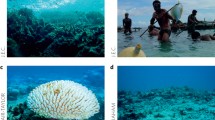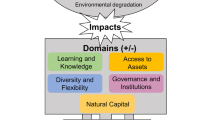Abstract
Scientific evidence gathered over the past five years suggests that northern Canada and the Arctic have undergone, and are undergoing, formidable environmental changes linked to global climate change. Environmental change in the north is expected to persist and intensify over the course of the next century. When large-scale environmental changes take place, they inevitably affect people, especially when the cultures and livelihoods of those people depend on their relationship with the environment. Managing the local impacts of these changes is a matter of adaptation. This paper discusses some of the policy implications of adaptation––government interventions aiming to build communities’ and regions’ capacities to adapt to environmental changes. Three arguments for adaptive capacity building interventions in the north are discussed, and these arguments are augmented by a comparative review of government reactions to the collapse of the cod fishery in Atlantic Canada. Reactive and proactive policy approaches are discussed, and it is suggested from the comparison that proactive approaches to intervention are desirable for building adaptive capacity.
Similar content being viewed by others
Notes
The number of those left unemployed by the moratorium is around 40,000 fishers and plant workers; however, it is also likely that a large number of people working in the service industry in affected communities were also negatively affected.
The National Round Table on the Environment and the Economy—See http://www.nrtee-trnee.ca/
ArcticNet—see http://www.arcticnet-ulaval.ca).
The Northern Strategy—see http://www.northernstrategy.ca/
Millennium Declaration and Goals—see A/57/270 on www.un.org/millenniumgoals
References
Ambrose R (2006a) Notes for an address to the UNFCCC Workshop on the Adaptation Fund, Edmonton, Alberta. See http://www.ec.gc.ca/minister/speeches/
Ambrose R (2006b) Remarks for CoP President Ambrose at opening of the discussions of future international cooperation on climate change, Bonn, Germany May 15, 2006 See http://www.ec.gc.ca/minister/speeches/
Arctic Climate Impact Assessment (2005) ACIA Scientific Report, Cambridge, Cambridge University Press. See http://www.acia.uaf.edu/
Aucoin P (1995) The new public management: Canada in comparative perspective, Montreal, Institute for Research on Public Policy, p. 277
Berkes F, Jolly D (2001) Adapting to climate change: Social-ecological resilience in a Canadian western arctic community. Conserv Ecol 5(2):18–32
Burton I (2005) Adapt and Thrive: Options for reducing the climate change adaptation Defict. Policy Options Dec. 2005–Jan. 2006: pp. 33–38
Burton I, Malone E, Huq S (2004) Adaptation policy frameworks for climate change: developing strategies, policies and measures. Cambridge University Press, Cambridge, p 266
Canada, Department of Fisheries and Oceans, Statistics: Nd., Licenses and Commercial, Online www.dfo.mpo.gc.ca/communic/statistics/main_e.htm
Canadian Charter of Rights and Freedoms (1982) Ottawa. See http://lois.justice.gc.ca
Dion S (2005) Climate change: sound decisions through solid science, opening remarks to the 24th plenary of the Intergovernmental Panel on Climate Change (IPCC), Montreal, Quebec. See http://www.ec.gc.ca/minister/speeches/
Fenge T (2001) The Inuit and climate change. Isuma Winter 2001: pp. 79–85
Finlayson A (1994) Fishing for truth: a sociological perspective of Northern Cod Stock Assessments from 1977–1990, St. Johns, Institute of Social and Economic Research, p. 176
Ford J, Smit B (2004) A framework for assessing the vulnerability of communities in the canadian arctic to risks associated with climate change. Arctic 57(4):389–400
Fox S (2002) These are the things that are really happening: inuit perspectives on the evidence and impacts of climate change in Nunavut. In: Krupnik I, Jolly D (eds) The earth is faster now: indigenous observations of Arctic environmental change, Fairbanks, Arctic Research Consortium, pp. 13–53
Government of Canada (2005a) Action on Climate Change: Considerations for an effective international approach (Discussion Paper for the Preparatory Meeting of Ministers for Montreal 2005: United Nations Climate Change Conference), Ottawa, Environment Canada and Foreign Affairs Canada. See http://www.montreal2005.gc.ca/
Government of Canada (2004) Memorandum of understanding for cooperation on addressing climate change, Toronto. See http://www.climatechange.gc.ca/
Government of Canada (2005b) Project Green: A plan for honouring our Kyoto commitment, Ottawa. See http://www.climatechange.gc.ca/
Harris M (1999) Lament for an ocean: the collapse of the Atlantic cod fishery: a true crime story. McClelland and Steward Inc, Toronto, p 389
Hassol SJ (2004) Impacts of a warming climate: arctic climate impact assessment. Cambridge University Press, Cambridge, p 140
Human Resources Development Canada (HRDC) (1998) TAGS/HRDC Final Evaluation Report. HRDC: Evaluation and Data Development. See http://www11.hrdc-drhc.gc.ca/
Intergovernmental Panel on Climate Change (IPCC) (2001) Climate Change 2001: Summary for Policy Makers (3rd Assessment Report). Cambridge, Cambridge University Press. See http://www.ipcc.ch/
Inuit Circumpolar Conference (ICC) (2005) Petition to the inter american commission on human rights seeking relief from violations resulting from global warming caused by acts and omissions of the United States. See http://inuitcircumpolar.com
Inuit Tapiriit Kanatami and the Inuit Circumpolar Conference (2004) Inuit call on Canada to act on international climate change report: Canada lacks national position as Arctic Melts—Inuit way of life jeopardized. Ottawa, November 8. See http://www.itk.ca
Keats D, Steele D, Green J (1986) A review of the recent status of the northern cod stock (nafo divisions 2j, 3k, and 3l) and the declining inshore fishery: a report, to the newfoundland inshore fisheries association, on scientific problems in the northern cod controversy, St. Johns, Newfoundland, unpublished
McGrath P (1911) Newfoundland in 1911. Morris and Company, London, Whitehead, p 271
McMahon F (1996) Looking the gift horse in the mouth: The impact of federal transfers on Atlantic Canada. Bounty Press, Halifax, p 118
National Snow and Ice Data Center (NSIDC) (2005) Sea ice decline intensifies, Boulder, University of Colorado. See http://nsidc.org/
Newton J (1995) An assessment of coping with environmental hazards in northern aboriginal Communities. The Canadian Geographer 39(2):112–120
Newton J, Paci J, Ogden A (2005) ‘Climate change and natural hazards in Northern Canada: integrating indigenous perspectives with government policy. Mitigation and Adaptation Strategies for Global Change 10:541–571
Nunavut Tunngavik Incorporated (NTIa) (2001) Elder’s Conference on climate change: Final Report, Cambridge Bay, Nunavut, p 94
Nunavut Tunngavik Incorporated (NTIb) (2005) What if the winter doesn’t come? Inuit perspectives on climate change adaptation challenges in Nunavut—summary workshop report, March 15–17, Iqaluit, Nunavut
Nunavut Land Claims Agreement (1993) Ottawa. See http://laws.justice.gc.ca/
Pal L (2006) Beyond policy analysis: public issue management in turbulent times. Thompson and Nelson, Toronto, p 420
Sinclair P (1987) State intervention and the newfoundland fisheries. Gower Publishing, Aldershot, p 155
Smit B, Pilifosova O (2003) From adaptation to adaptive capacity and vulnerability reduction. In: Smith J, et al. (eds) Climate change, adaptive capacity and development. Imperial College Press, London, pp 9–28
Smith J, Lavender B, Smit B, Burton I (2001) Climate change and adaptation policy. Isuma (appears in French), Winter 2001:pp 75–81
United Nations Framework Convention on Climate Change (UNFCCC) (1992) Rio de Janeiro.See http://www.unfccc.org
Woodrow, M (1996) Resistance to regulatory change in the fishery: a case study of nine communities in Bonavista North, PhD Thesis, Department of Sociology, Laval
Acknowledgements
The ideas and arguments presented in this paper were originally developed as part of a MA thesis. The authors wish to thank Jaime Dawson for her input and suggestions regarding early drafts of this paper. The authors also wish to thank two anonymous reviewers, whose comments and suggestions added greater depth to the manuscript. The research was funded through the authors’ involvement with ArcticNet, Project 4.7: Science to Policy Makers and People (website: http://www.arcticnet-ulaval.ca). ArcticNet is a Network of Centres of Excellence of Canada.
Author information
Authors and Affiliations
Corresponding author
Rights and permissions
About this article
Cite this article
Budreau, D., McBean, G. Climate change, adaptive capacity and policy direction in the Canadian North: Can we learn anything from the collapse of the east coast cod fishery?. Mitig Adapt Strat Glob Change 12, 1305–1320 (2007). https://doi.org/10.1007/s11027-006-9053-6
Received:
Accepted:
Published:
Issue Date:
DOI: https://doi.org/10.1007/s11027-006-9053-6




